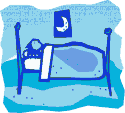Bringing Bedtime Back

In adapting to a fast-paced lifestyle, students have forgotten a basic necessity: sleep! With demanding class schedules, study cramming, and endless party opportunities, the level of sleep deprived Canadian college students is measured at 20 percent and climbing, according to the National Sleep Foundation. But is this a passing trend or organic inevitability? There are some biological reasons that sleep deprivation and college lifestyles exist hand in hand, but it’s still very possible to keep sleep under control. Building healthy sleeping habits even before hitting post-secondary schedules can help decrease your chances of falling into that insomniac bracket, and increase your chances of academic success.
High school senior Andy Scarfone feels defeated in his efforts to conquer his body clock. “It’s awful trying to get up for school in the morning,” he claims. “My body just refuses to function that early! I’m definitely no stranger to falling asleep in class.”
Andy doesn’t face this problem alone, and his personal activities may not be to blame. The National Sleep Foundation claims that teen circadian rhythms are naturally different from those of younger children or adults, thus having school hours initially set by adult workers means it’s often difficult for teen bodies to match the schedules laid out for them. No earlier than 11 p. m., adolescent bodies begin producing the hormone melatonin, a powerful sleep-inducer. By 8 a. m., melatonin still hasn’t stopped pumping through their systems. When student sleep patterns are forced to adjust to suit class schedules that vary day-to-day, midnight study sessions, and the occasional party marathon, the instability causes narcoleptic symptoms to arise, hijacking alertness and contributing to failure and dropout rates.
Sleep-deprived students typically have poorer grades and higher frequencies of health problems than their cozy counterparts. Researchers discovered that activity occurs in the same area of the brain during sleep as it does during learning information; sleep being a crucial step in organizing and strengthening memories. Without these hours of unconscious convalescence, sleep deprived students are prone to falling behind. Sleep deprivation contributes to skin problems like acne, and instigates aggression and depression. Stressed and tired teens reach for fried and sugary foods to boost energy, garnering higher chances of unhealthy weight gain (often the dreaded “freshman fifteen” can be attributed to such behaviour). Lack of sleep also deepens the effects of alcohol, dangerous for college students whose bodies are at an age where consumption is barely legal in the first place.
So how can we melatonin over-producing, unstable schedule-fighting students find sleep peace? It’s all about making conscious efforts towards being unconscious on a consistent basis. Teens need an average of eight to nine hours of sleep every night! A National Sleep Foundation survey found that college/university-aged students get an average of only 6.8 hours. Freshman students faced the highest amounts of sleep loss due to the stressful transition period between high school and post-secondary lifestyles. Keep that ideal average (eight to nine hours) in mind when watching late-night TV or browsing Facebook for hours on end.
It is also important to relax your mind when preparing for a full night’s sleep, reducing stress and loosening up after demanding academics and extra-curriculars. That means no 24, Flashpoint, or Call of Duty before bed. Take it easy and read a book or a magazine – this helps your mind unwind and lets you get to sleep more quickly.
Another way to keep a steady circadian rhythm is resisting the urge to nap. Sleeping for more than 30 minutes during the day can throw off your sleep schedule and do more harm than good, so save up those tired feelings to ensure a full night’s sleep instead.
As for all-nighters, it is best to avoid them. That exam will be kinder to you if you have a good night’s sleep under your belt than if you stay up all night cramming information into your tired head. Your test will be less stressful and less drool-stained. Once a healthy sleep pattern is achieved, you may be able to absorb the information better in class in the first place.
When it comes to sleep, every minute counts. By taking small steps, acknowledging your need for sleep, and making the conscious decision to maintain healthy and consistent sleep schedules, you will always be waking up ready to fulfill your potential.





Leave a comment!